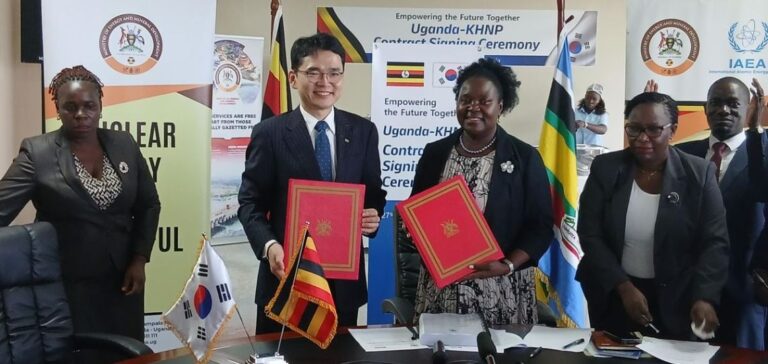Korea Hydro & Nuclear Power (KHNP) has been appointed as the lead contractor by Uganda’s Ministry of Energy and Mineral Development to evaluate a site in the Buyende District for the construction of the country’s first nuclear power plant. The contract, signed on May 27 in the capital Entebbe, spans a period of 26 months through July 2027.
An assessment aligned with international standards
KHNP will work alongside Dohwa Engineering and KEPCO Engineering & Construction to examine climatic conditions, natural hazards, cooling sources, human-related incidents, and the behaviour of radioactive materials. All factors will be assessed in accordance with International Atomic Energy Agency (IAEA) standards. The stated objective is to propose a site layout suitable for the installation of four South Korean-designed APR1400 reactors.
This agreement follows a memorandum of understanding signed between the two countries in March 2023. KHNP described the new contract as a significant first step toward exporting its nuclear technologies to the African continent.
A programme embedded in Uganda’s national strategy
Uganda’s government included nuclear energy in its Uganda Vision 2040 roadmap, released in April 2013. The plan aims to build six pressurised water reactors with a total capacity of 8400 MWe by 2040. The site selected for the initial project is located in Kasaato Village, Kidera Subcounty, with alternative locations pre-identified in the districts of Nakasongola and Kiruhura.
Since its Atomic Energy Act came into force in 2008, Uganda has formalised several international partnerships, including with China and Russia. According to the Ugandan energy ministry, eight sites were reviewed at the national level before a final selection was made.
Energy diversification driven by hydro reliance
Currently, about 80% of Uganda’s electricity is generated from hydropower. In the context of population growth and rising demand, the introduction of nuclear power aims to diversify energy supply sources and strengthen long-term energy security. In August 2023, President Yoweri Museveni announced that South Korea and Russia had been selected to build two nuclear power plants with a combined capacity of 15 GWe.
“This contract is a meaningful first step toward exporting our Korean-type reactors to the African market,” said KHNP President Hwang Joo-ho, as quoted by the company during the signing ceremony.






















